Inventory Management
Patient Tracking
Medication Management
Asset Management
Hospitals
Clinics
Pharmaceutical Companies
Laboratories
Tags
Readers
Software
Services
Active RFID
Passive RFID
Semi-Passive RFID
North America
Europe
South America
Asia Pacific
Middle East and Africa
North America Outlook (USD Billion, 2019-2035)
North America Healthcare RFID Market by Application Type
Inventory Management
Patient Tracking
Medication Management
Asset Management
North America Healthcare RFID Market by End Use Type
Hospitals
Clinics
Pharmaceutical Companies
Laboratories
North America Healthcare RFID Market by Product Type
Tags
Readers
Software
Services
North America Healthcare RFID Market by Technology Type
Active RFID
Passive RFID
Semi-Passive RFID
North America Healthcare RFID Market by Regional Type
US
Canada
US Outlook (USD Billion, 2019-2035)
US Healthcare RFID Market by Application Type
Inventory Management
Patient Tracking
Medication Management
Asset Management
US Healthcare RFID Market by End Use Type
Hospitals
Clinics
Pharmaceutical Companies
Laboratories
US Healthcare RFID Market by Product Type
Tags
Readers
Software
Services
US Healthcare RFID Market by Technology Type
Active RFID
Passive RFID
Semi-Passive RFID
CANADA Outlook (USD Billion, 2019-2035)
CANADA Healthcare RFID Market by Application Type
Inventory Management
Patient Tracking
Medication Management
Asset Management
CANADA Healthcare RFID Market by End Use Type
Hospitals
Clinics
Pharmaceutical Companies
Laboratories
CANADA Healthcare RFID Market by Product Type
Tags
Readers
Software
Services
CANADA Healthcare RFID Market by Technology Type
Active RFID
Passive RFID
Semi-Passive RFID
Europe Outlook (USD Billion, 2019-2035)
Europe Healthcare RFID Market by Application Type
Inventory Management
Patient Tracking
Medication Management
Asset Management
Europe Healthcare RFID Market by End Use Type
Hospitals
Clinics
Pharmaceutical Companies
Laboratories
Europe Healthcare RFID Market by Product Type
Tags
Readers
Software
Services
Europe Healthcare RFID Market by Technology Type
Active RFID
Passive RFID
Semi-Passive RFID
Europe Healthcare RFID Market by Regional Type
Germany
UK
France
Russia
Italy
Spain
Rest of Europe
GERMANY Outlook (USD Billion, 2019-2035)
GERMANY Healthcare RFID Market by Application Type
Inventory Management
Patient Tracking
Medication Management
Asset Management
GERMANY Healthcare RFID Market by End Use Type
Hospitals
Clinics
Pharmaceutical Companies
Laboratories
GERMANY Healthcare RFID Market by Product Type
Tags
Readers
Software
Services
GERMANY Healthcare RFID Market by Technology Type
Active RFID
Passive RFID
Semi-Passive RFID
UK Outlook (USD Billion, 2019-2035)
UK Healthcare RFID Market by Application Type
Inventory Management
Patient Tracking
Medication Management
Asset Management
UK Healthcare RFID Market by End Use Type
Hospitals
Clinics
Pharmaceutical Companies
Laboratories
UK Healthcare RFID Market by Product Type
Tags
Readers
Software
Services
UK Healthcare RFID Market by Technology Type
Active RFID
Passive RFID
Semi-Passive RFID
FRANCE Outlook (USD Billion, 2019-2035)
FRANCE Healthcare RFID Market by Application Type
Inventory Management
Patient Tracking
Medication Management
Asset Management
FRANCE Healthcare RFID Market by End Use Type
Hospitals
Clinics
Pharmaceutical Companies
Laboratories
FRANCE Healthcare RFID Market by Product Type
Tags
Readers
Software
Services
FRANCE Healthcare RFID Market by Technology Type
Active RFID
Passive RFID
Semi-Passive RFID
RUSSIA Outlook (USD Billion, 2019-2035)
RUSSIA Healthcare RFID Market by Application Type
Inventory Management
Patient Tracking
Medication Management
Asset Management
RUSSIA Healthcare RFID Market by End Use Type
Hospitals
Clinics
Pharmaceutical Companies
Laboratories
RUSSIA Healthcare RFID Market by Product Type
Tags
Readers
Software
Services
RUSSIA Healthcare RFID Market by Technology Type
Active RFID
Passive RFID
Semi-Passive RFID
ITALY Outlook (USD Billion, 2019-2035)
ITALY Healthcare RFID Market by Application Type
Inventory Management
Patient Tracking
Medication Management
Asset Management
ITALY Healthcare RFID Market by End Use Type
Hospitals
Clinics
Pharmaceutical Companies
Laboratories
ITALY Healthcare RFID Market by Product Type
Tags
Readers
Software
Services
ITALY Healthcare RFID Market by Technology Type
Active RFID
Passive RFID
Semi-Passive RFID
SPAIN Outlook (USD Billion, 2019-2035)
SPAIN Healthcare RFID Market by Application Type
Inventory Management
Patient Tracking
Medication Management
Asset Management
SPAIN Healthcare RFID Market by End Use Type
Hospitals
Clinics
Pharmaceutical Companies
Laboratories
SPAIN Healthcare RFID Market by Product Type
Tags
Readers
Software
Services
SPAIN Healthcare RFID Market by Technology Type
Active RFID
Passive RFID
Semi-Passive RFID
REST OF EUROPE Outlook (USD Billion, 2019-2035)
REST OF EUROPE Healthcare RFID Market by Application Type
Inventory Management
Patient Tracking
Medication Management
Asset Management
REST OF EUROPE Healthcare RFID Market by End Use Type
Hospitals
Clinics
Pharmaceutical Companies
Laboratories
REST OF EUROPE Healthcare RFID Market by Product Type
Tags
Readers
Software
Services
REST OF EUROPE Healthcare RFID Market by Technology Type
Active RFID
Passive RFID
Semi-Passive RFID
APAC Outlook (USD Billion, 2019-2035)
APAC Healthcare RFID Market by Application Type
Inventory Management
Patient Tracking
Medication Management
Asset Management
APAC Healthcare RFID Market by End Use Type
Hospitals
Clinics
Pharmaceutical Companies
Laboratories
APAC Healthcare RFID Market by Product Type
Tags
Readers
Software
Services
APAC Healthcare RFID Market by Technology Type
Active RFID
Passive RFID
Semi-Passive RFID
APAC Healthcare RFID Market by Regional Type
China
India
Japan
South Korea
Malaysia
Thailand
Indonesia
Rest of APAC
CHINA Outlook (USD Billion, 2019-2035)
CHINA Healthcare RFID Market by Application Type
Inventory Management
Patient Tracking
Medication Management
Asset Management
CHINA Healthcare RFID Market by End Use Type
Hospitals
Clinics
Pharmaceutical Companies
Laboratories
CHINA Healthcare RFID Market by Product Type
Tags
Readers
Software
Services
CHINA Healthcare RFID Market by Technology Type
Active RFID
Passive RFID
Semi-Passive RFID
INDIA Outlook (USD Billion, 2019-2035)
INDIA Healthcare RFID Market by Application Type
Inventory Management
Patient Tracking
Medication Management
Asset Management
INDIA Healthcare RFID Market by End Use Type
Hospitals
Clinics
Pharmaceutical Companies
Laboratories
INDIA Healthcare RFID Market by Product Type
Tags
Readers
Software
Services
INDIA Healthcare RFID Market by Technology Type
Active RFID
Passive RFID
Semi-Passive RFID
JAPAN Outlook (USD Billion, 2019-2035)
JAPAN Healthcare RFID Market by Application Type
Inventory Management
Patient Tracking
Medication Management
Asset Management
JAPAN Healthcare RFID Market by End Use Type
Hospitals
Clinics
Pharmaceutical Companies
Laboratories
JAPAN Healthcare RFID Market by Product Type
Tags
Readers
Software
Services
JAPAN Healthcare RFID Market by Technology Type
Active RFID
Passive RFID
Semi-Passive RFID
SOUTH KOREA Outlook (USD Billion, 2019-2035)
SOUTH KOREA Healthcare RFID Market by Application Type
Inventory Management
Patient Tracking
Medication Management
Asset Management
SOUTH KOREA Healthcare RFID Market by End Use Type
Hospitals
Clinics
Pharmaceutical Companies
Laboratories
SOUTH KOREA Healthcare RFID Market by Product Type
Tags
Readers
Software
Services
SOUTH KOREA Healthcare RFID Market by Technology Type
Active RFID
Passive RFID
Semi-Passive RFID
MALAYSIA Outlook (USD Billion, 2019-2035)
MALAYSIA Healthcare RFID Market by Application Type
Inventory Management
Patient Tracking
Medication Management
Asset Management
MALAYSIA Healthcare RFID Market by End Use Type
Hospitals
Clinics
Pharmaceutical Companies
Laboratories
MALAYSIA Healthcare RFID Market by Product Type
Tags
Readers
Software
Services
MALAYSIA Healthcare RFID Market by Technology Type
Active RFID
Passive RFID
Semi-Passive RFID
THAILAND Outlook (USD Billion, 2019-2035)
THAILAND Healthcare RFID Market by Application Type
Inventory Management
Patient Tracking
Medication Management
Asset Management
THAILAND Healthcare RFID Market by End Use Type
Hospitals
Clinics
Pharmaceutical Companies
Laboratories
THAILAND Healthcare RFID Market by Product Type
Tags
Readers
Software
Services
THAILAND Healthcare RFID Market by Technology Type
Active RFID
Passive RFID
Semi-Passive RFID
INDONESIA Outlook (USD Billion, 2019-2035)
INDONESIA Healthcare RFID Market by Application Type
Inventory Management
Patient Tracking
Medication Management
Asset Management
INDONESIA Healthcare RFID Market by End Use Type
Hospitals
Clinics
Pharmaceutical Companies
Laboratories
INDONESIA Healthcare RFID Market by Product Type
Tags
Readers
Software
Services
INDONESIA Healthcare RFID Market by Technology Type
Active RFID
Passive RFID
Semi-Passive RFID
REST OF APAC Outlook (USD Billion, 2019-2035)
REST OF APAC Healthcare RFID Market by Application Type
Inventory Management
Patient Tracking
Medication Management
Asset Management
REST OF APAC Healthcare RFID Market by End Use Type
Hospitals
Clinics
Pharmaceutical Companies
Laboratories
REST OF APAC Healthcare RFID Market by Product Type
Tags
Readers
Software
Services
REST OF APAC Healthcare RFID Market by Technology Type
Active RFID
Passive RFID
Semi-Passive RFID
South America Outlook (USD Billion, 2019-2035)
South America Healthcare RFID Market by Application Type
Inventory Management
Patient Tracking
Medication Management
Asset Management
South America Healthcare RFID Market by End Use Type
Hospitals
Clinics
Pharmaceutical Companies
Laboratories
South America Healthcare RFID Market by Product Type
Tags
Readers
Software
Services
South America Healthcare RFID Market by Technology Type
Active RFID
Passive RFID
Semi-Passive RFID
South America Healthcare RFID Market by Regional Type
Brazil
Mexico
Argentina
Rest of South America
BRAZIL Outlook (USD Billion, 2019-2035)
BRAZIL Healthcare RFID Market by Application Type
Inventory Management
Patient Tracking
Medication Management
Asset Management
BRAZIL Healthcare RFID Market by End Use Type
Hospitals
Clinics
Pharmaceutical Companies
Laboratories
BRAZIL Healthcare RFID Market by Product Type
Tags
Readers
Software
Services
BRAZIL Healthcare RFID Market by Technology Type
Active RFID
Passive RFID
Semi-Passive RFID
MEXICO Outlook (USD Billion, 2019-2035)
MEXICO Healthcare RFID Market by Application Type
Inventory Management
Patient Tracking
Medication Management
Asset Management
MEXICO Healthcare RFID Market by End Use Type
Hospitals
Clinics
Pharmaceutical Companies
Laboratories
MEXICO Healthcare RFID Market by Product Type
Tags
Readers
Software
Services
MEXICO Healthcare RFID Market by Technology Type
Active RFID
Passive RFID
Semi-Passive RFID
ARGENTINA Outlook (USD Billion, 2019-2035)
ARGENTINA Healthcare RFID Market by Application Type
Inventory Management
Patient Tracking
Medication Management
Asset Management
ARGENTINA Healthcare RFID Market by End Use Type
Hospitals
Clinics
Pharmaceutical Companies
Laboratories
ARGENTINA Healthcare RFID Market by Product Type
Tags
Readers
Software
Services
ARGENTINA Healthcare RFID Market by Technology Type
Active RFID
Passive RFID
Semi-Passive RFID
REST OF SOUTH AMERICA Outlook (USD Billion, 2019-2035)
REST OF SOUTH AMERICA Healthcare RFID Market by Application Type
Inventory Management
Patient Tracking
Medication Management
Asset Management
REST OF SOUTH AMERICA Healthcare RFID Market by End Use Type
Hospitals
Clinics
Pharmaceutical Companies
Laboratories
REST OF SOUTH AMERICA Healthcare RFID Market by Product Type
Tags
Readers
Software
Services
REST OF SOUTH AMERICA Healthcare RFID Market by Technology Type
Active RFID
Passive RFID
Semi-Passive RFID
MEA Outlook (USD Billion, 2019-2035)
MEA Healthcare RFID Market by Application Type
Inventory Management
Patient Tracking
Medication Management
Asset Management
MEA Healthcare RFID Market by End Use Type
Hospitals
Clinics
Pharmaceutical Companies
Laboratories
MEA Healthcare RFID Market by Product Type
Tags
Readers
Software
Services
MEA Healthcare RFID Market by Technology Type
Active RFID
Passive RFID
Semi-Passive RFID
MEA Healthcare RFID Market by Regional Type
GCC Countries
South Africa
Rest of MEA
GCC COUNTRIES Outlook (USD Billion, 2019-2035)
GCC COUNTRIES Healthcare RFID Market by Application Type
Inventory Management
Patient Tracking
Medication Management
Asset Management
GCC COUNTRIES Healthcare RFID Market by End Use Type
Hospitals
Clinics
Pharmaceutical Companies
Laboratories
GCC COUNTRIES Healthcare RFID Market by Product Type
Tags
Readers
Software
Services
GCC COUNTRIES Healthcare RFID Market by Technology Type
Active RFID
Passive RFID
Semi-Passive RFID
SOUTH AFRICA Outlook (USD Billion, 2019-2035)
SOUTH AFRICA Healthcare RFID Market by Application Type
Inventory Management
Patient Tracking
Medication Management
Asset Management
SOUTH AFRICA Healthcare RFID Market by End Use Type
Hospitals
Clinics
Pharmaceutical Companies
Laboratories
SOUTH AFRICA Healthcare RFID Market by Product Type
Tags
Readers
Software
Services
SOUTH AFRICA Healthcare RFID Market by Technology Type
Active RFID
Passive RFID
Semi-Passive RFID
REST OF MEA Outlook (USD Billion, 2019-2035)
REST OF MEA Healthcare RFID Market by Application Type
Inventory Management
Patient Tracking
Medication Management
Asset Management
REST OF MEA Healthcare RFID Market by End Use Type
Hospitals
Clinics
Pharmaceutical Companies
Laboratories
REST OF MEA Healthcare RFID Market by Product Type
Tags
Readers
Software
Services
REST OF MEA Healthcare RFID Market by Technology Type
Active RFID
Passive RFID
Semi-Passive RFID

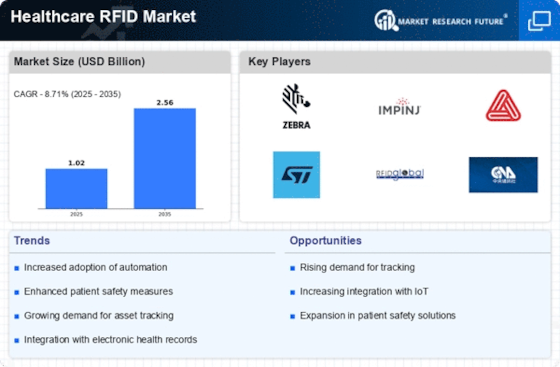
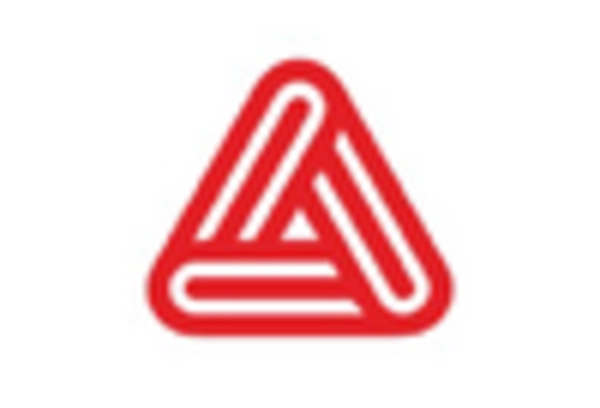

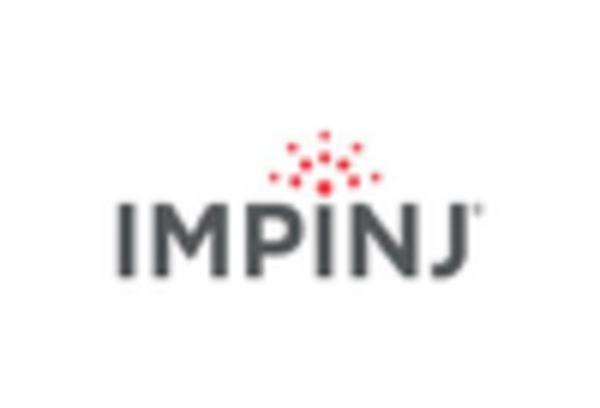
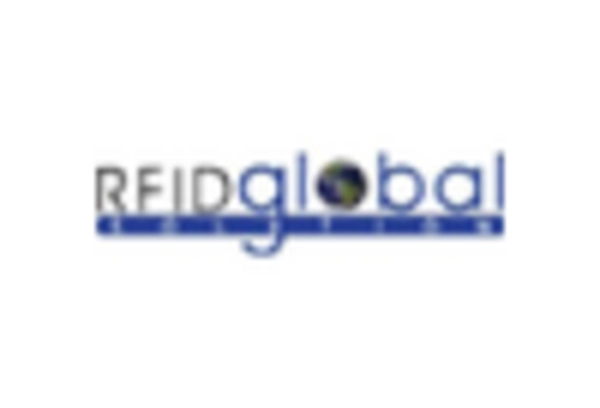
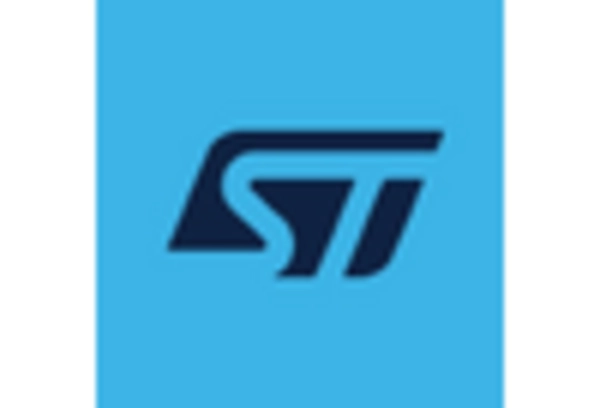


Leave a Comment